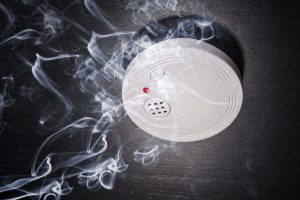It’s easy to forget about fire safety in the long list of responsibilities that come with caring for an aging adult, but it’s importance cannot be underestimated. Typical fire safety plans need to be adapted to each elderly adult’s specific needs, and family caregivers should make it a priority. Here are 6 tips for seniors and family caregivers on reducing home fire dangers:

1. Check Smoke Detectors.
Aging adults that rely on a family caregiver are usually not in a position to check smoke detectors. They are mounted on the ceiling and require a stepladder or chair to access them. Seniors with poor vision, bad balance, or other physical limitations simply cannot perform the important smoke detector test twice per year. Family caregivers need to make sure their aging loved one has working smoke detectors throughout the home at all times.
2. Install Senior-Friendly Alarms.
Smoke detectors are critical in delivering a warning to an aging adult about a fire but if the aging adult is hard of hearing, the warnings could go unheeded. Because most fire injuries and fatalities take place when people are sleeping, it’s essential to install alarms that use vibrations and flashing lights instead of a siren if the elderly adult is deaf or suffers from poor hearing.
3. Eliminate Cooking Hazards.
Seniors should avoid cooking, grilling, frying or broiling unless they have excellent memory and physical stamina. Cooking fires are one of the leading causes of house fires, and it’s all too common for elderly adults to forget about what they have going on in the kitchen when they leave the room for a minute. Distractions, memory lapses, and even slow reaction times can turn cooking a simple meal into a real problem.
4. Beware of Smoking Dangers.
Smoking indoors is a huge contributor to the number of house fires each year. Seniors who smoke should try to do so outside if possible. If they cannot, they should definitely only smoke when alert and near an ashtray. Above all, elderly adults should not smoke in bed or as they are falling asleep in a chair or on a sofa.
5. Monitor Space Heaters.
Elderly adults face more difficulties in regulating their body temperature and often turn to electric heaters like space heaters. These can tip easily or come into contact with fabric or furniture that will then ignite. Aging adults must be ever watchful if they use a space heater and always make sure it is clear of any material and that it is also out of the way of foot traffic.
6. Hire Home Care Providers.
Home care providers are professionals with experience in taking care of seniors that struggle with day-to-day activities due to physical or cognitive limitations. Having a home care provider with the aging adult throughout the day or night means the senior isn’t responsible for those activities and situations that can cause house fires or jeopardize early warnings if a fire has already started. Family caregivers can have peace of mind knowing their loved one is safe when a home care provider is present.

